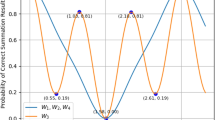Abstract
Quantum secure multi-party summation is a specific primitive of classical secure multi-party computation. Compared with classical secure multi-party summation based on mathematical difficulty problems such as integer factorization and discrete logarithm which has been threatened by potential quantum computers, the quantum version can provide unconditional security for the computing tasks. A quantum protocol based on the entanglement swapping between d-level Bell state and d-level cat state is constructed to perform secure multi-party summation. With the aid of a semi-honest third party who does not conspire with any participant, the proposed protocol can calculate the non-modular sum of the secret integers held by the participants who do not trust each other. Not only can the protocol resist the attacks from both outside and semi-honest third party, but also resist participants’ attack, even though there are at most \(n-2\) participants colluding together. (n is the number of participants.) This protocol only needs \(O(\log M)\) (M is the maximum value of all secret integers) quantum resources to complete the computing task. Specially, under the condition of computing the sum of larger integers for a small number of participants, this protocol utilizes fewer quantum resources and has higher efficiency than other proposed protocols.


Similar content being viewed by others
Explore related subjects
Discover the latest articles, news and stories from top researchers in related subjects.References
Yao, A.C.: in Proc. of the 23rd Annual IEEE Symposium on Foundations of Computer Science, 1982 (1982), pp. 160–164
Goldreich, O., Micali, S., Wigderson, A.: in Proc. of the nineteenth annual ACM symposium on Theory of computing (1987), pp. 218–229
Katz, J.: in Proc. of the 39th annual ACM symposium on Theory of computing (2007), pp. 10–20
Gordon, S.D., Hazay, C., Katz, J., Lindell, Y.: in Proc. of the 40th annual ACM symposium on Theory of computing (2008), p. 413
Freedman, M.J., Nissim, K., Pinkas, B.: in Proc. of EUROCRYPT 2004 (Berlin, Heidelberg, 2004), pp. 1–19
Aly, A., Van Vyve, M.: in International Conference on Financial Cryptography and Data Security, pp. 110–129. , (Berlin, Heidelberg (2017)
Maheshwari, N., Kiyawat, K.: in 2011 Fifth Asia Modelling Symposium, pp. 187–192. (2011)
Du, W., Atallah, M.J.: in Proc. of the 2001 Workshop on New Security Paradigms (2001), pp. 13–22
Shor, P.: in Proc. of 35th Annual Symposium on the Foundations of Computer Science (Los Alamitos. CA , 124–134 (1994)
Grover, L.K.: in Proc. of the 28 Annual ACM Symposium on Theory of Computing (1996), pp. 212–219
Bennett, C.H, Brassard, G.: in Proc. of IEEE International Conference on Computers (Bangalore, Indian, 1984), pp. 175–179
Vaccaro, J.A., Spring, J., Chefles, A.: Physical Review A 75(1), 012333 (2007)
Zhang, C., Situ, H., Huang, Q., Yang, P.: Int. J. Quant. Inf. 15(2), 1750010 (2017)
Shi, R.H., Zhang, S.: Quant. Inf. Proc. 16(9), 225 (2017)
Ji, Z.X., Zhang, H.G., Wang, H.Z., Wu, F.S., Jia, J.W., Wu, W.Q.: Quant. Inf. Proc. 18(6), 168 (2019)
Duan, M.Y.: Int. J. Theor. Phys. 59(11), 1638 (2020)
Cerf, N.J.: Acta Physica Slovaca 48(3), 115 (1998)
Cerf, N.J.: J. Modern Opt. 47(2–3), 187 (2000)
Cerf, N.J.: Phys. Rev. Lett. 84(19), 4497 (2000)
Guo, F.Z., Gao, F., Qin, S.J., Zhang, J., Wen, Q.Y.: Quant. Inf. Proc. 12(8), 2793 (2013)
Ji, Z.X., Ye, T.Y.: Quant. Inf. Proc. 16(7), 177 (2017)
Karimipour, V., Bagherinezhad, S., Bahraminasab, A.: Physical Review A 65(4), 042320 (2002)
Yang, Y.G., Xia, J., Jia, X., Hua, Z.: Quant. Inf. Proc. 12(2), 877 (2013)
Gan, Z.G.: Int. J. Theoret. Phys. 59(10), 3086 (2020)
Li, C.Y., Zhou, H., Y, Y. Wang, F.G. Deng, : Chin. Phys. Lett. 22(5), 1049 (2005)
Chen, Y., Man, Z.X., Xia, Y.J.: Chin. Phys. Lett. 24(1), 19 (2007)
Gao, F., Qin, S.J., Wen, Q.Y., Zhu, F.C.: Quant. Inf. Comput. 7(4), 329 (2007)
Acknowledgements
This work was supported in part by the National Natural Science Foundation of China (No. 61632020), the Science and Technology Innovation Bases Special Project of Key Laboratory of Shandong Province for Software Engineering (No. 11480004042015), the NSFC of Shandong (No. ZR2018MA014), the PCSIRT (No. IRT1264), and the Fundamental Research Funds of Shandong University (No. 2017JC019).
Author information
Authors and Affiliations
Corresponding author
Ethics declarations
Conflicts of interest
The authors declared that they have no conflicts of interest to this work.
Additional information
Publisher's Note
Springer Nature remains neutral with regard to jurisdictional claims in published maps and institutional affiliations.
Rights and permissions
About this article
Cite this article
Wang, Y., Hu, P. & Xu, Q. Quantum secure multi-party summation based on entanglement swapping. Quantum Inf Process 20, 319 (2021). https://doi.org/10.1007/s11128-021-03262-2
Received:
Accepted:
Published:
DOI: https://doi.org/10.1007/s11128-021-03262-2



